

SHOPFLOOR
HISTORY IN THE MAKING ... MANDATE APPOINTS ITS FIRST FEMALE GENERAL SECRETARY TO LEAD

IT’S IN YOUR GIFT... BE KIND TO SHOP WORKERS THIS CHRISTMAS
UNION
MANDATE’S new general secretary Lorraine O’Brien has vowed to work with members to build “a stronger, more vibrant union that we all can be proud of”.
In a message to members, she said she would do all in her power to advance the interests of retail, bar and administrative workers and their families.
She told Shopfloor: “Our union’s strength lies in its collective voice, and I am committed to amplifying that voice at every opportunity.
“Everyone deserves a fair wage, job security, certainty and respect in the workplace, and as a union we will continue to advocate for these rights.”
The National Executive Council announced the appointment on 30th November. It is a significant moment for the union as Lorraine is Mandate’s first female general secretary.
Lorraine, who had many years’ experience working in the retail sector before joining Mandate as an official, said: “I am deeply honoured to serve an organisation that has been an integral part of my professional life for the past 25 years.”
She previously worked as Divisional Organiser in the Southern Division, National Co-ordinator, Interim Assistant General Secretary and as Interim General Secretary.
Admitting that bricks and mortar retail trade had seen significant change in recent years, Lorraine insisted the union must evolve “to meet those challenges head-on and to seize opportunities to build a stronger, more equitable future for our members.”
3
Our core demands have not changed
By David Gibney Mandate communications officer
LAST MONTH, Mandate set out its pre-General Election stall in the runup the November 29th poll.
Following the election, it looks most likely that there will some form of reiteration of the Fianna Fáil-Fine Gael administration that has been in place since 2020 – with one or other of the smaller parties thrown in for good measure.
Whatever shape this new government takes, Mandate’s core demands on securing the best outcomes for its members remain the same.
The union is calling for the full implementation of the EU Minimum Wage Directive in the spirit it was drafted. This means affording all workers the right to collectively bargain through a trade union of their choice.
Mandate is also demanding new protections for trade union activists who experience union-busting practices, as laid out in the Respect at Work campaign.
This includes:
l The right to protection – No one should be punished for organising for better pay and conditions at work. Mandate wants employee representatives protected in law when they stand up for themselves or their colleagues – and an end to victimisation.
l The right to access a trade union – Everyone should be able to access information about their rights at work through a trade union. Ignorance isn’t bliss – and employers shouldn’t be able to keep workers in the dark about their entitlements or how to organise for better outcomes.
l The right to discussion –Everyone should have the right to discuss their terms and conditions with their colleagues. Too many employers are trying to ban these discussions through draconian contracts – it’s time to end these gag clauses.
l Sub-minimum wage rates –

Mandate is demanding the end of the discriminatory sub-minimum wage rates which exploit young workers. Despite a recommendation from the Low Pay Commission, the previous administration refused to adopt this necessary change.
l Part-time workers – Mandate is demanding amendments to legislation to allow part-time workers access to full-time hours when requested, as provided for under the EU Part Time Workers’ Directive. The union also wants to see legislation enacted or a statutory instrument to allow the introduction of part-time to fulltime ratios in retail.
l Keeping workers safe in the
bar or on the shop floor – Mandate is demanding that the new administration legislates for it to be a specific offence to abuse or assault retail and bar workers.
Housing
Mandate is backing the full implementation of the demands of the Raise the Roof campaign, including enhanced funding for public, affordable and cost rental units. Ireland has never had as many homeless, nor had as many people in housing stress. Inadequate action from past administrations has created a chaotic housing system, with negative and detrimental impacts for hundreds of thousands
Healthcare
Mandate is demanding the full implementation of Sláintecare, which, as the Minister for Health stated as its goal in 2021, “to introduce a universal health and social care system where everyone has equitable access to services based on need, and not ability to pay.”
Our healthcare system is crumbling and we regularly see preventable deaths due to badly managed resources. Mandate is calling on the new administration to be prepared to take on vested
interests in order to ensure an equitable system that meets the needs of workers.
Education
Trade unions are a force for progress in Ireland, and always have been. Employers have gradually removed supports for trade union activists to engage in education and training. Mandate is calling for legislation to enable trade union activists to avail of appropriate paid release for education and representation purposes.
Climate change
Mandate is calling for State investment in renewable energy and the ending of Ireland’s reliance on fossil fuels. Most Mandate members are young and want to have a future on this planet. This requires the new administration in whatever form it takes to genuinely tackle the climate emergency while protecting the incomes and living standards of our most vulnerable people.
International & Palestine
In January 2024, the International Court of Justice (ICJ) said it is plausible that Israel’s actions in Gaza Strip could amount to genocide. In July 2024, the ICJ declared that Israel’s occupation of the Gaza strip and the West Bank, including East Jerusalem, is unlawful. Despite these rulings, Ireland still has taken no action to prevent genocide from occurring nor has it taken measures to ensure goods and services from illegal settlements are prevented from entering Ireland.
Mandate wants to see the full implantation of the Occupied Territories Bill (OTB) and the immediate cessation of the US military in Shannon. To not implement these basic measures would make Ireland complicit with Israel’s crimes. Mandate is also demanding Ireland maintains its status as a neutral country.
Don’t lose your cool call to shoppers, be kind to our members at Christmas FESTIVE PLEA
MANDATE is calling on the general public to respect retail workers during the busy and often emotionally-intense Christmas shopping season.
And Mandate’s newly-appointed general secretary Lorraine O’Brien underlined how important the issue is for shop workers.
She told Shopfloor: “On Christmas morning we all want to wake up to a massive bundle of presents under the tree and a well-stocked larder. But getting to that point can be fraught with having to endure the Christmas shopping experience – which for many is less than fun.
“We appreciate that this can be a time of sky-high stress levels but we would like shoppers to spare a thought for hard-pressed retail
staff serving them at the tills or re-stocking the shelves.
“Be kind to our members during the festive season. They’re doing their jobs to the best of their ability – and of course please extend that kindness to the rest of the year.”
Lorraine added: “It makes a real difference and we can all enjoy a peaceful and happy Christmas.”
In the past Mandate has called on employers to implement a zero-tolerance approach to safeguarding the safety, health and welfare of all workers.
Last January, Ireland ratified the International Labour Organisation’s Convention No. 190, setting out a common framework for ac-
tion to shape the future of the world of work, and in particular workplaces that are free from violence and harassment.
Meanwhile, an Early Day Motion calling for retail workers to be treated with kindness during the festive trading period was tabled in the House of Commons, in Westminster, on 29th November.
The motion, signed by 23 MPs, notes that the festive period can be “an especially complex and challenging time for retail businesses” with shop workers “working hard to keep shelves stocked and products delivered”.
Referencing recent Usdaw figures that showed over two-thirds of retail staff in the
UK had experienced verbal abuse in the past 12 months, it affirmed that “any mistreatment of colleagues in stores is wholly unacceptable and should not be tolerated.”
Early Days Motions (EDMs) are motions submitted for debate in the House of Commons for which no day has been fixed. As there is no specific time allocated to EDMs very few are debated. However, many attract a great deal of public interest and media coverage. By attracting the signatures of other MPs, they can be used to demonstrate the level of parliamentary support for a particular cause or point of view.
Picture:
Mandate
who cannot access affordable housing.
Together we will build a stronge r, more vibrant union to be proud of

IN TAKING on the role of general secretary of our trade union, I am deeply honoured to serve an organisation that has been an integral part of my professional life for the past 25 years.
My journey in retail, from the shop floor to this leadership role, has been shaped by the collective strength, resilience, and solidarity that our union represents.
I am passionate and fully committed to advocating for our members and ensuring that our union remains a powerful force for positive change and an integral part of the retail sector in Ireland.
In recent years, the retail sector has undergone significant transformations. From the rapid rise of e-com-
MESSAGE TO MEMBERS
General Secretary Lorraine O’Brien
merce and automation to the challenges posed by economic uncertainty and global events, retail workers have found themselves navigating an increasingly complex landscape.
Now, more than ever, our union must evolve to meet these challenges head-on and to seize opportunities to build a stronger, more equitable future for our members.
At the heart of our union are its members and my priority is to ensure that every member feels empowered to have their voice heard and their
rights at work protected.
Our union’s strength lies in its collective voice, and I am committed to amplifying that voice at every opportunity. Everyone deserves a fair wage, job security, certainty and respect in the workplace, and as a union we will continue to advocate for these rights.
As with other sectors, the future of work in retail will be shaped by technology, and our union must stay ahead of these changes to ensure they benefit, rather than harm our members. We must proactively
engage with employers and policymakers to influence how automation and digital transformation are implemented in the retail sector. We must strive to ensure that new technologies enhance job quality and security rather than erode it.
Our members’ voices will always be at the heart of these efforts, and I encourage every member to get involved – whether by attending meetings, participating in campaigns, Local Councils, organising initiatives or training programmes.
I have no doubt that while we may have challenges ahead, through our collective efforts we can work together to build a stronger more vibrant union that we can all be proud of.
Dunnes pay and benefits claim lodged
Survey insights
The recent survey conducted by Mandate revealed that:
l 31% of respondents identified increased pay as their top priority, emphasising the need for wages that reflect length of service and equal access to pay scales.
l 20% prioritised improvements to the sick pay scheme, citing concerns about limited protection and disparities between newer and longer-serving employees.
l Concerns were raised about management practices, particularly regarding disrespect and poor communication, which led to feelings of being undervalued.

l Many workers expressed frustration over the lack of full-time contracts and unequal distribution of additional hours, with some newer employees receiving more hours than long-serving staff.
Note: These insights have directly informed the 2024 Pay & Benefits Claim, ensuring it addresses the most pressing issues faced by Dunnes workers.
MORE THAN 1,000 Dunnes workers, who took part in a Mandate survey in July, have clearly flagged up what their top priorities are for the year ahead.
Feedback from this exercise has helped shape Mandate’s 2024 pay and benefits claim, with a call for significant improvements in pay, working conditions, and overall workplace fairness for all workers at the national retailer.
The claim, endorsed at the National Dunnes Workers Meeting in November, reflects members’ thinking on the issue – and Mandate has formally sent the claim to senior Dunnes management.
The key demands of the 2024 pay & benefits claim include:
l Fair Pay Increase: A €1.50 per hour increase across all points of the Dunnes pay scale.
l Union Recognition: Guaranteeing workers the right to have their voices heard through their chosen union.
l Pay Equality: Ensuring all Dunnes workers reach the top pay scale after 10 years of service.
l Annual Leave: Increasing entitlements based on years of service, with the option to take additional days individually.
l Hours Allocation: Providing access to full-time contracts and ensuring fair distribution of additional hours among existing staff.

l Work-Life Balance: Offering full pay for maternity and paternity leave, implementing flexible shift patterns, and posting rosters four weeks in advance.
l Sick Leave: Extending entitlements based on years of service, with immediate access from day one of employment.
l Discount Card: Allowing longserving staff to retain their discount card upon retirement as a mark of appreciation.
l Respect and Dignity: Fostering a respectful work environment with improved communication and fair treatment from management.
Dunnes workers share their stories...


13 years of reporting from the frontline & shop floor...
SHOPFLOOR




"What we’re looking for is fairness. A €1.50 per hour increase would make a real difference to workers like me, especially in covering the rising cost of living. It’s time Dunnes valued our contributions properly."
"Dunnes is a profitable company making millions every year, yet workers are still struggling to access full-time hours or sick pay when they need it. These changes are essential to ensure fairness for all workers."
Mandate Organiser Gerard Halligan told Shopfloor: "This claim represents the collective voice of Dunnes workers, who are calling for fairness, respect, and recognition. We’re asking Dunnes to meet the same progressive standards already set by other leading retailers in Ireland."
The union has asked for an urgent meeting with Dunnes management to discuss the claim and have stressed that these demands are not just about improving pay and benefits but also about fostering a positive and respectful workplace environment.
Halligan continued: "This is a critical moment for Dunnes workers. These changes are about recognising the value of longserving staff, improving work-life balance, and creating a workplace where every worker feels respected.
“Mandate will continue to advocate the vital importance of improving members' core terms and conditions. We will also keep members updated on any developments with updates at www.dunnesworkers.com
“In the meantime, we are encouraging workers to support the campaign by sharing their stories through our social media channels and by speaking to non-members in their stores about the importance of joining Mandate,” he added.

"Union recognition is essential. Collective bargaining would allow Dunnes workers to negotiate for better pay, fairer conditions, and the respect we deserve. It’s time for Dunnes to recognise our union, ensuring that every worker’s voice is heard and valued."
Picture:
Phalinn
Patrick Killeen Dunnes worker from Mayo:
Gerard Halligan: ‘This is a critical moment’
Stephanie Kenny Dunnes worker rom Sligo:
Cathy McLoughlin represents workers in Dundalk:
Mandate backs Stop Crime Against Retailers drive
Union supports call for stronger protections for shop workers – but employers must play their
By David Gibney Mandate communications officer
MANDATE has welcomed calls from retail bodies for greater protections for shop workers who face abuse, harassment, or assault.
But the union, which represents more than 20,000 workers in the sector, says employers have a greater role to play in protecting staff and ensuring their safety.
The Stop Crime Against Retailers campaign – which is supported by SuperValu, Eurospar, Mace, Centra, Londis and Costcutter, among other outlets – is seeking mandatory jail sentences or ASBOs for those who abuse, harass or assault staff.
They are also seeking a local retail crime hotline, changes to defamation laws so shop workers can ask if someone has paid for goods, as well as more Garda presence on the ground in retail areas.
Mandate said these provisions from Government are part of the solution, but insist that much more is needed.
The union has campaigned for years that abuse and assaults be cat-

egorised as a standalone offence.
Mandate has argued that shop workers should be treated the same as other frontline workers who are already afforded these protections.
Mandate claims it has feedback from members detailing how many retailers underinvest in security.
This means that the responsibility of policing stores is being placed on shop workers, who are often female and have no training in how to deal with confrontations.
When Mandate surveyed its mem-
bers, 78% said they did not believe their employer was doing enough to protect them.
Furthermore, shop workers have previously called on employers to provide mental health supports for workers who have experienced abuse or assaults. According to the union, nine times out of 10, such help has been refused.
One Mandate member, who wished to remain anonymous, told Shopfloor: “Depending on how it is affecting the employee, employers
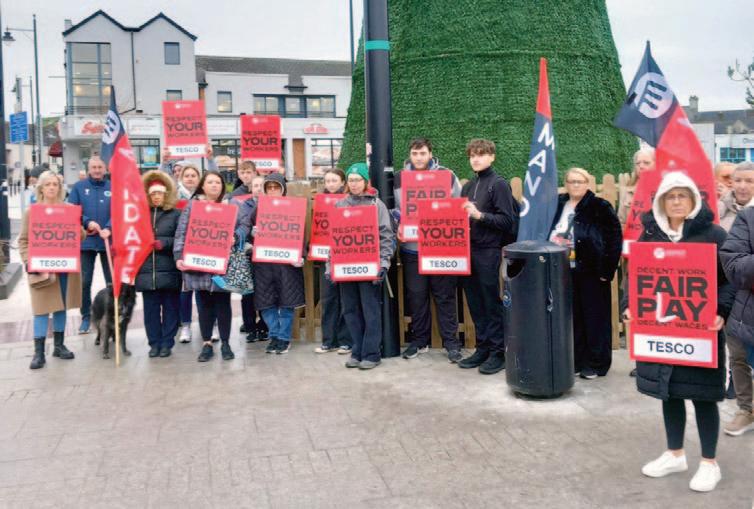
should provide medical and counselling services and also have a ‘right to refuse’ sign displayed letting customers know the policy.”
Another Mandate member explained how the “customer is always right” policy has a negative impact in the workplace: “We should be allowed to answer back reasonably to customers without being afraid of being hauled into the office if we get a complaint.”
Solutions identified by Mandate members and shop workers include:
part too
l Employers to provide training on how to handle abusive situations.
l Employers provide counselling for those who have experienced abuse.
l Employers to provide more instore security – including extending security staff hours to include dangerous times of the day.
l Managers should not always take the customer’s side as a default position.
l Prominently display of ‘no tolerance to abuse’ signs – and the implementation of such a policy.
l Clearer basic information on refunds and sale policies so the employee is not isolated when implementing the company’s demands.
Mandate insists that abuse is not part of the job. Customers, employers and politicians all have a role to play in ensuring shop workers are protected. The union insists that retail employers and the incoming Government must play their part and provide a safe and secure employment for all workers in the state.
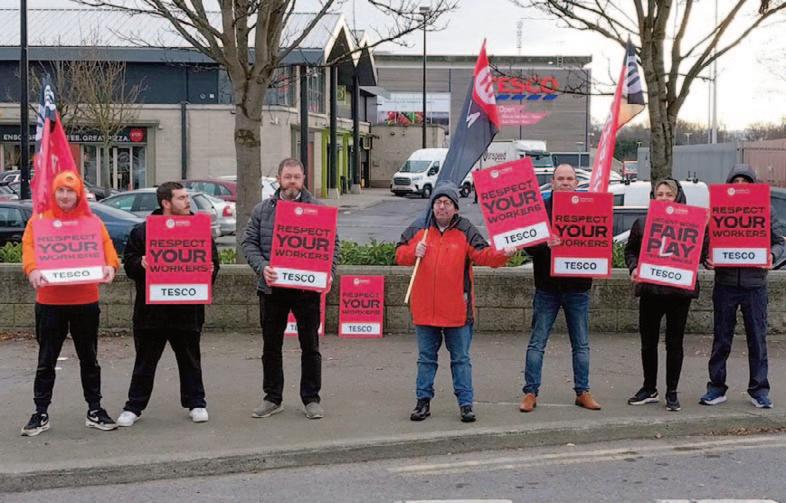
MANDATE members working for Tesco have taken part in a series of public protests following management’s decision to deny them the right to be represented by their own trade union and the company’s refusal to agree to an adequate pay increase. The first protest took place on 12th December at Ardkeen in Waterford. This was followed the next day by a protest in Navan and on the 15th in Cabra. Workers have vowed to continue their campaign until
Tesco bosses agree to “respect their workers”.
Mandate has negotiated on behalf of Tesco workers with the company since it entered the Irish market in 1997. However, in recent years, management have refused to collectively bargain and instead imposed pay awards on employees.
The union insists the imposition of these pay awards is wholly inadequate and a sign of the disrespect the has retain giant has for its own workforce.
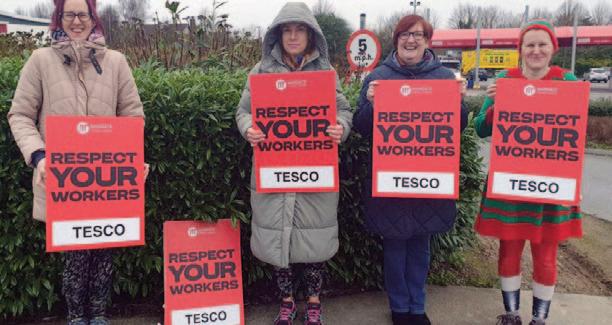
“Tesco is a highly profitable company and that’s because of their staff,” Mandate General Secretary Lorraine O’Brien told Shopfloor
“Tesco sales are up 9.4% in Ireland, their after tax profits rose by 10% and they paid a dividend of €100m to the parent company, but
wages only went up by 4% in 2024. The company announced a 3% increase for 2025, which is only half the pay claim of 6% that we lodged a number of months ago,” she added.
Mandate condemns Tesco’s refusal to engage in meaningful collective bargaining and its total
disregard for the pay and benefits claims submitted by Mandate members.
Ms O’Brien continued: “The company’s actions can only be seen as a clear act of bad faith tantamount to textbook union-busting tactics.
“Tesco’s refusal to allow union members to vote on any final proposed agreement exposes the undemocratic nature of the company’s actions and exposes the myth that Ireland’s voluntarist industrial relations system is a level playing field for all parties.
“Mandate is highlighting through these protests the manner in which our members are disrespected on an ongoing basis. We will continue to engage with our members across the country to ensure that they receive Fair Play and Fair Pay. Our message is simple: Tesco Respect Your Workers,” added Ms O’Brien.
Fury at the checkout: A 2023 campaign poster from the Australian retail workers union SDA highlighting the issue
Picture: SDA
CABRA
Workers in Ireland on minimum wage pay OVER HALF of their salary on rent
WORKERS in Ireland on the statutory minimum wage living in rented accommodation pay more than HALF their salary (55%) to landlords, according to the latest Eurostat data. That’s significantly higher than the average percentage (35%) paid by renters of a two-bedroom property across the EU.
Rent accounts for half of the monthly earnings of low paid workers in three countries (Netherlands, Ireland, Luxembourg) while in a further eight member states it is equivalent to 40% or more.
The figures also reveal that the cost of rented accommodation has risen by 3% – and house prices by 2.9% – over the past year. Since 2010, rents have more than doubled in nine EU member states, with costs particularly severe in cities, where most jobs are located. The rental increases were highest in Estonia (+203%), Lithuania (+178%), Ireland (+106%) and Hungary (+104%).
ETUC General Secretary Esther Lynch (pictured below) said the figures represented “further proof” that housing was “increasingly being treated as a way to make a quick profit rather than a place to live”.
She continued: “Millions of working people see a huge part of their wages leave their bank accounts as soon as it comes in simply to keep a roof above their heads.
“Despite paying high rents with low wages, their accommodation is often totally inadequate, ex posing them and their families to health conditions. Others are forced to sleep on the couch in their friends’ apartments, continue living with their parents when possible, and even sleep in their cars.”
Welcoming the appointment of Dan Jørgensen, a former climate and

energy minister in Denmark, to become Europe’s first commissioner on housing, she said it “couldn’t come soon enough”.
Lynch added: “Working people now expect him to take action which matches the scale of Europe’s housing crisis. It is time we once again treated adequate housing as a basic human right by building more social homes and properly regulating the rental market.”

Mandate Divisional Organiser Eoin Coates said the Euroigures backed up “what we already know – work is not paying for those living on the minimum wage in Ireland”. He continued: “This newly re-elected government has failed to tackle the rise in the cost of living and has encouraged

businesses to pay the minimum wage to large groups of workers, including those in retail, administration and in the bar sector.

“Every day I am meeting members who have been left with no choice but to live off housing assistance payments, or who are on long social housing waiting lists. Since when was it acceptable for us to have a working poor in this country?
“While the increase in the minimum wage is welcome, the lack of housing availability, its ever increasing cost, and given there is no matched wage growth has left many of our members without a home to call their own."

ETUC calls for action on housing
l Ensuring quality and secure jobs, promoting collective bargaining and increasing statutory minimum wages to meet the cost of housing;
l Tackling speculation and hoarding, including through more progressive taxation for real estate and reinforced regulation of short-term rentals;
l Supporting investment in non-for-profit / limited profit / public / social affordable and adequate housing;
l Placing social conditions on public funding and state aid for housing projects to ensure quality and direct jobs, as well as better working conditions in the construction sector;
l Guaranteeing minimum quality, health, accessibility and safety standards for accommodation, and rent regulations to protect renters against exploitation and abuse, ending no-fault evictions, and suspending evictions of vulnerable families;
l Putting in place planning that ensures that housing is connected with high-quality public services, including transport, healthcare, education, and childcare.
‘Robust’ claim lodged at PTSB... and joined up thinking on
MANDATE, along with the FSU, have lodged a “robust” pay and benefits covering 2025 claim for members working in Permanent TSB.
Industrial Officer/Organiser John O’Donnell told Shopfloor talks were currently under way with management and that bi-weekly meetings were due to take place until an agreement is brokered. “I would describe it as a robust claim with a number of different aspects to it,” he said.
O’Donnell also pointed out that Mandate had
a cross-table arrangement with the other unions at PTSB and that they had forged a “good relationship” through monthly meetings.
And he was keen to highlight the innovative use of LinkedIn as a platform by Mandate to update members at PTSB – something FSU had been doing for a while.
“Our members at PTSB – because of the service they're in – they use different platforms outside of our normal communications
channels. I noticed that FSU used LinkedIn to brief their members and that the PTSB also encourage employees to share bank stuff on the platform.
“So I used Mandate LinkedIn to show that we’re also active in the employment. The very first post was about the membership survey closing and that we were preparing our claim –and the feedback we’re getting is very positive,” he added.
Eoin Coates: ‘backs up what we already know’
Mandate links with ISSU ‘have gone from strength to strength’
MANDATE’S LINKS with the Irish Second-Level Students’ Union (ISSU) “have gone from strength to strength” over the last few years –and in particular its involvement with the Skills Academy Future Leaders initiative.
Held annually over three days in August, the Future Leaders course brings together young activists from across Ireland for workshop-based training and discussions.
Industrial Officer Organiser John O’Donnell said the union was “honoured” to have taken part over the last three years.
He told Shopfloor: “We are more
than pleased to build on our relationship with ISSU – it is continuing to grow from strength to strength.
“It is vital that we get into secondary schools. This is particularly because engaging those just beginning their working life on rights and emphasising the need for trade unions is at the forefront of our mission.
“Our attendance at events such as these provides us with the opportunity to forge links with young workers and provide them with the knowledge they need when entering the workforce.”
Pay deal brokered and agreement on banded hours review
MANDATE secured a national pay agreement of 21 months duration with Penneys seeing hourly rates increase by more than a euro over the period. Hourly rates rose by 55c per hour backdated to April 21st 2024 for all hours worked, with a further 50c increase from February 20th, 2025.
The fashion retailer, which has 36 outlets across the Republic, also agreed to a review of the banded hours agreement alongside a commitment to talks on putting in place a new procedural agreement in the first quarter of 2025.
The deal was accepted in a national ballot of members. Interim Assistant General Secretary Jim Fuery told Shopfloor: “Mandate officials visited all Penneys stores across the country over a period of two weeks to ballot our members on this proposal.
“The National Negotiation Committee worked very hard during these negotiations to ensure that members not only received a well-deserved pay increase but also ensuring that the union’s two aims of having a review of the existing banded hours agreement and talks on a new procedural agreement were achieved too.”



Usdaw welcomes UK govt move to thwart organised crime gangs stealing to order
RETAIL TRADE union Usdaw has given its full backing to new UK Government proposals to introduce ‘Respect Orders’ as part of its Crime and Policing Bill.
The measure is aimed at the most serious offenders who plague town centres and neighbourhoods with anti-social behaviour. Respect orders will give police and councils the powers they need to crack down on repeated anti-social behaviour.
Welcoming the move, Usdaw
General Secretary Paddy Lillis said: “We very much welcome the announcement of new Respect Orders to tackle repeat offenders who terrorise shops and high streets, striking fear into the hearts of retail workers whenever they enter the store.”
The latest crime statistics for England and Wales, released in June 2024, show that police recorded incidents of shoplifting – 469,788 incidents – is a 106% rise on the
NEC member speaks at Connolly book launch
Mandate NEC member Eoghan Fox (left), in his role as President of Galway Council of Trade Unions, at the 2nd November launch of a new book of James Connolly’s early writings in Charlie Byrne’s Bookshop in Galway city.
The book, titled The Lost and Early Writings of James Connolly, 1889-1898, was compiled by labour historian and researcher Conor McCabe and brings together some of Ireland’s greatest revolutionary’s earliest articles, letters and speeches.
Much of the contents of the book have remained unpublished or have been inaccessible for over a century. The writings offer a rare glimpse into Connolly's evolving political thought as he navigated the fight for workers' rights, socialism, and Irish independence.
Historian and lecturer John Cunningham and author Conor McCabe also spoke at the event.
Standing up
against those who would sow division
HUNDREDS of trade unionists and anti-racism activists joined ICTU’s Rally for Unity and Hope on Saturday 23rd November.
The focus of the event, which was fully supported by Mandate, was a gathering at the Larkin statue on O’Connell Street, Dublin, in an open display of solidarity against those who would seek to sow division on grounds of race and nationality.
Some one in five workers in Ireland is a citizen of another country.
Speaking at the event, ICTU General Secretary Owen Reidy said: “Now, more than ever, we need to come together. This rally is a call to all who believe in building a society rooted in unity, respect, hope and decent, secure jobs, affordable homes, and better GP and hospital care.
figures for 2021.
Lillis added: “It is increasingly common for retail stores to be targeted by organised crime gangs stealing to order. This is in no way a victimless crime, with weapons and violence used to ensure these criminals are not stopped.
“Having to deal with repeated and persistent offences can cause issues beyond the theft itself, such as anxiety, fear and physical harm to retail workers.”
“As a movement, we hold those in power responsible for delivering what we all need to thrive. That means policy decisions that deliver for working people, not the wealthy few. It’s a reminder that every person who lives and works here – regardless of where they come from – is part of our community and deserves to feel safe and valued.”
He added: “We stand up against those who seek to divide us and spread hate in our communities and workplaces. Where they sow division, we stand for unity.”
Paddy Lillis welcomes UK govt measure
Time to abolish sub-min rates, TDs told
MANDATE Divisional Organiser Greg Caffrey and Mandate member Andrew Mannion took the union’s call for equal pay justice for young workers to the heart of government during the summer.
They went before a 10th July sitting of the Joint Oireachtas Committee of Enterprise, Trade and Employment to make a presentation on sub-minimum rates of pay in the National Minimum Wage and to answer questions from members of the Committee.
In his presentation, Caffrey described the Equal Pay for Young Workers legislation, a Private Member’s Bill sponsored by Dublin South West TD Paul Murphy, as a “necessary amendment” to National Minimum Wage legislation pointing out that discrimination based on age is prescribed under the Employment Equality Act.
He told the Committee: “The Employment Equality Act, although it provides protections for the citizens of Ireland, alarmingly contains a provision which permits age discrimination to be facilitated through the National Minimum Wage Act by allowing it to prescribe for Sub-Minimum rates of pay to be paid to young workers solely based upon their age.”
Caffrey described this as a “contradiction” to current legislation under the Employment Equality Act and insisted that the implementation of sub-minimum rates facilitated the discrimination and exploitation of young workers.
Quoting from ESRI stats, he said that there are currently 15,000 young workers receiving sub-minimum rates of pay and insisted that Ireland was “an outlier” in a EU context on the issue.
The Committee was told the Low Pay Commission had recommended a two- and four-year review following the abolishing of sub-minimum rates “to examine and quantify” any adverse impact this might have.
Caffrey continued: “Irish society in general terms encourages and promotes to young people the concept of entering the workforce, contributing to society, gaining their own independence, and learning to support themselves.
“However, a significant discouraging factor is when a young person enters the workforce and finds they not being treated on equal terms to their co-workers on the National

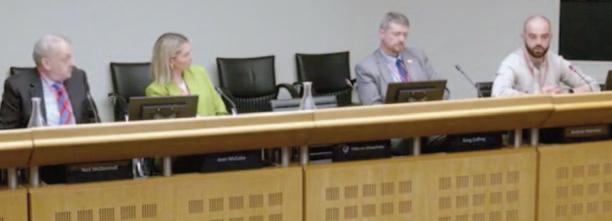
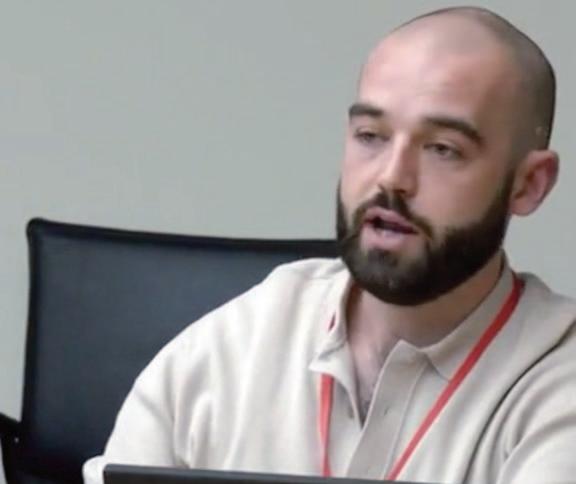
Irish society in general terms encourages and promotes to young people the concept of entering the workforce, contributing to society, gaining their own independence, and learning to support themselves. However, a significant discouraging factor is when a young person enters the workforce and finds they not being treated on equal terms to their co-workers on the National Minimum Wage because they receive sub-minimum rates of pay.
Minimum Wage because they receive sub-minimum rates of pay.”
And he suggested that if sub-minimum wages were abolished, younger workers would have a greater chance of being independent and self-sufficient, adding that this would give them greater spending power in the local and wider economy “and actually increase business revenues”.
Caffrey also rubbished employers’ claims that sub-minimum wages took into account the lack of experi-
ence of the individual worker.
He explained: “These employers all provide induction training which is normally conducted by a worker on National Minimum Wage, by ‘showing the young worker the ropes’ or ‘shadowing for a day or two’.
“These young workers are then expected to have the same productivity levels on pay that is up to 30% less than their counterparts on the National Minimum Wage. This is an utterly imbalanced, unequal, unfair and disproportionate treatment of young workers, which must cease immediately.”
At the Committee hearing, Andrew Mannion was asked by Paul Murphy TD about the impact subminimum wages were having on young people’s mental health.
He replied: “I can guarantee you that there are young people on subminimum rates of pay who are trying to combat the spiralling cost of living whether it be increases in the cost of groceries or transport – you name it – it will have a serious impact on people’s mental health.”
He went on to point out that workers were not guaranteed a set number of hours, making it even more difficult and stressful to make ends meet.
Caffrey agreed and said the payment of sub-minimum rates was “absolutely a disincentive” to young workers and insisted that its unfairness was having a “detrimental effect on their mental health and wellbeing”.
Case history: 18-year-old student in Galway
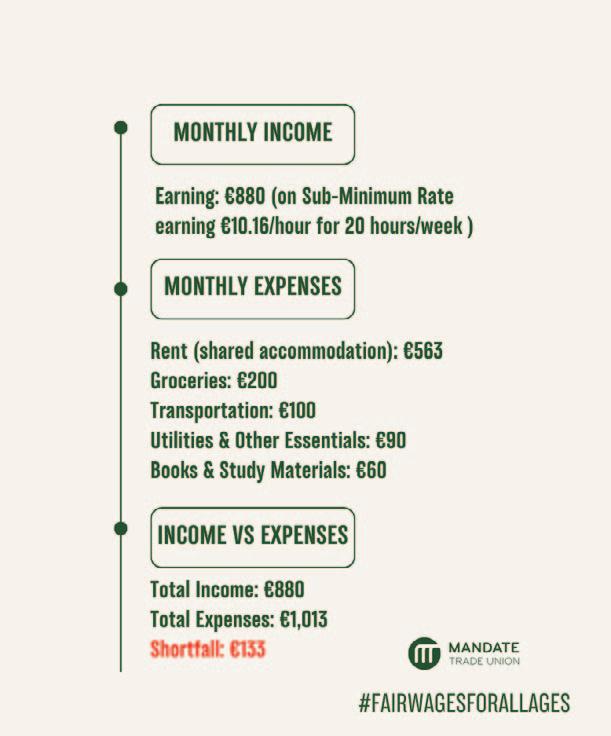
Andrew Mannion spoke about mental health impact of sub-minimum rates of pay
Divisional Organiser Greg Caffrey answering questions at the Joint Oireachtas Committee hearing on 10th July Pictures: Oireachtas
SUB-MINIMUM WAGES
VIEWPOINT
Lobbying for pay justice for workers on submin rates
By Ken Reilly Industrial Officer/Organiser
The National Minimum Wage (Equal Pay for Young Workers) Bill 2022 is currently at Committee stage in the legislative process. Mandate Trade Union has championed this Bill from its conception and remain steadfast in our belief that sub-minimum wages are discriminatory in nature, despite the legal loopholes which currently exist, and facilitate this opportunity for employers with which to exploit cheap labour.
At our Biennial Delegate Conference in April, our young workers proposed that Mandate’s campaign to fight for the abolition of these sub-minimum wage rates become union policy, and we are proud to say that a motion was supported unanimously by all delegates present, confirming this as Mandate policy.
In light of this, and given where the Bill currently stands, we have been campaigning and calling for
ANALYSIS
FAT CATS
support from a wide variety of sources – public interest groups, local organisations, youth and student organisations, and most importantly, the law makers in this country.
We lobbied for cross-party support, seeking to work in collaboration with politicians to ensure that the Bill does not gather dust on a shelf, whilst young workers in Ireland are faced with reduced earning potential, and continue to seek to build their lives away from these shores.
In July this year, on the anniversary of the previous government’s initial kicking-down-the-road of the Bill, Mandate staged a protest outside the Dáil before the Bill was reread.
This Bill was moved on to the committee stage, and Mandate Divisional Organiser Greg Caffrey, accompanied by Mandate member Andrew Mannion, represented our young workers in combative style in
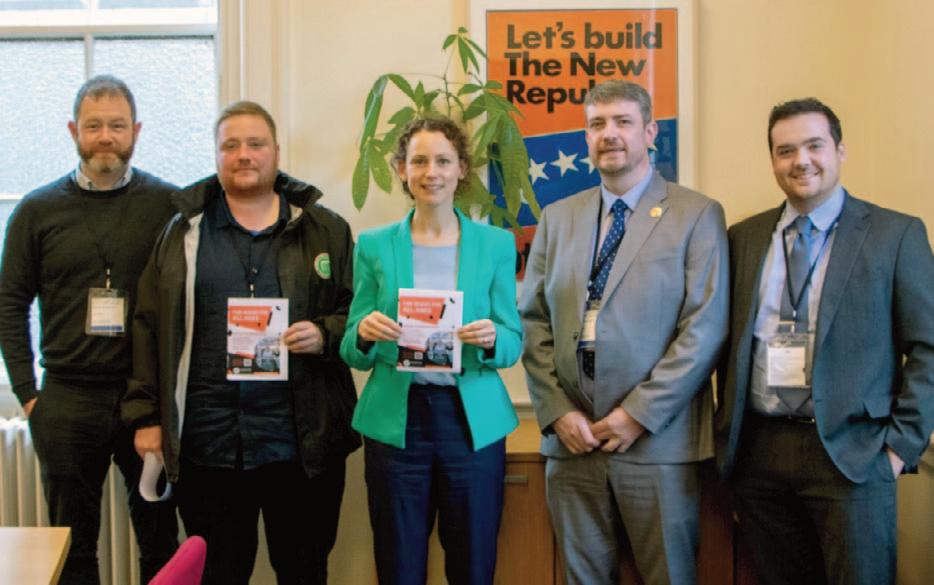
a televised
debate.
This Bill may well be in a state of flux at present, as the formulation of the next government takes shape, however, there remains some hope.
As recently as October, I was part of a Mandate delegation, comprised of Greg Caffrey, Eoin Coates and
Mandate Youth Committee activist Cian Keogh, who met with thenLabour Party Senator, Marie Sherlock, who at the General Election in November, pipped Gerard Hutch for the final seat as a TD in the Dublin Central constituency.
Marie has stated she fully supports the Bill, and we will be calling on Deputy Sherlock, and all of the newly-elected TDs, to support finalising this Bill and ending the potential exploitation of the youngest members of the workforce, once the formation of the new government is finalised.
ETUC: Corporate greed holding back investment
THE chiefs of some corporations have treated their businesses like “get-rich-quick scheme(s)” rather doing the right thing and “investing in the future”, it has been claimed.
ETUC General Secretary Esther Lynch made the comments following a comparative analysis of gross profit shares versus gross investment rates of major nonfinancial corporations across 12 EU member states.
According to the ETUC analysis, gross investment has fallen by 9% across the EU since 2019 and is at its lowest rate since 2014, when the economy was still reeling from the 2007-2008 financial crisis.
By contrast, profit share has risen by 3% since 2019. That has coincided with a huge increase in dividends, meaning profits have


been siphoned out of companies and into the pockets of wealthy shareholders.
In doing this, the ETUC claim, corporations are harming Europe’s competitiveness by choosing to hoard a greater share of profits instead of reinvesting them to raise productivity and create quality jobs.
ETUC General Secretary Esther Lynch said: “Everyone agrees that we urgently need to raise
and yet we see some CEOs treating businesses like a get-rich-quick scheme rather than investing in the future.
“EU data clearly shows that part of the solution to raising productivity and staying competitive
creating a more responsible corporate culture in Europe. “European companies should be reinvesting more of their profits to raise productivity and create quality jobs, not wasting it on bigger CEO bonuses or siphoning it off in more dividends for rich shareholders.”
Oireachtas
Labour Party’s Marie Sherlock (centre) meets with Mandate delegation (from left) Ken Reilly, Cian Keogh, Greg Caffrey and Eoin Coates
CAMPAIGNS
RESPECT AT WORK CAMPAIGN
Major report on union busting launched
RESPECT at Work, a workers’ rights campaign group with Mandate as one of its founders, has launched a new report highlighting anti-union activities by employers across Ireland.
The report, titled Union Busting: An Inconvenient Truth, is based on a survey of 159 workplace reps drawn from four unions – Mandate, CWU, the Financial Services Union, and SIPTU.
The initiative is supported by a number of other unions, including INMO, Connect, INTO, TUI, the USI and ISSU along with the National Womens Council and the Migrant Rights Centre of Ireland.
Put together with the help of academics from Queen’s University, Belfast, the research revealed that 69% of workplace reps had observed at least one form of antiunion behaviour by employers, with the most common being victimisation of union activists (42%) and discouraging workers from joining a union (40%).
Its findings also flag up the harmful impact employer hostility to unions has on reps, with 43% of respondents saying it had negatively affected their mental and physical health.
Dr Gareth Murphy, lead author of the report, said: “This research is unique in giving voice to local workplace reps and their experiences of how employers respond to unionising and organising activity. Sadly, for too many, it is not a good experience.”
Claiming the research “dispelled the myth” that union busting isn’t an issue in Ireland, he insisted “it happens a lot”.
Dr Murphy added: “Workers should feel safe and empowered to assist and support their colleagues at work. They should feel safe to join and be active in their trade union. Politicians need to listen to this damning report and address workers’ concerns.”
SIPTU Deputy General Secretary, Ethel Buckley, speaking on behalf of the campaign, said it was time for new legislation to ensure that every worker can stand up for better terms and conditions without fear of victimisation or reprisals.
“It has been clear for years that Ireland has some of the weakest workers’ rights in Western Europe. Now, with this report, we can see the consequences.
“It is time for politicians to step up and commit to including protections for workplace representatives as part of a robust National Action Plan on Collective Bargaining.”
She added: “Injustice is rampant in Irish workplaces and, too often, when workers try to stand up for better, they are punished. That climate of fear must end.”
The Respect at Work campaign
was particularly active in the run-up to the November 29th General Election as a means of lobbying and securing support from candidates.
Mandate Interim Assistant General Secretary Jim Fuery explained: “The campaign website (www.respectatwork.ie) had a link for union members as well as members of the general public to lobby their constituency candidates through a generic letter asking them to sign the campaign’s pledge.
“These candidates across all the constituencies who responded were then lobbied by officials from all four unions who asked them to sign the Respect at Work pledge card. What’s heartening is that more than 250 did so, including seven out of 10 party leaders.”
The candidates, including those party leaders, pledged “to support legislation which promotes collective bargaining, protects workplace representatives and ensures the right to access a trade union at work.”
Some 89 of successful general election candidates lobbied by the campaign signed up to the pledge.
Pointing out that this constitutes a majority of TDs in the Dáil, Jim added: “The campaign will continue to lobby those 89 TDs as the potential coalition partners negotiate a programme for government.
“Our aim is to ensure that those parties that do form the next government legislate in keeping with the pledge and that future opposition party TDs who signed the pledge will continue to put pressure on the new government to do so.”
Fuery was keen to remind readers of Shopfloor that whatever government is in place, they will be obliged to promote collective bargaining under a EU Directive that comes into effect in November 2025.
He added: “Mandate along with the three other unions aim to make sure that legislation is in place that not only promotes collective bargaining but also protects workplace representatives and allows workers to access a trade union in their workplaces.”
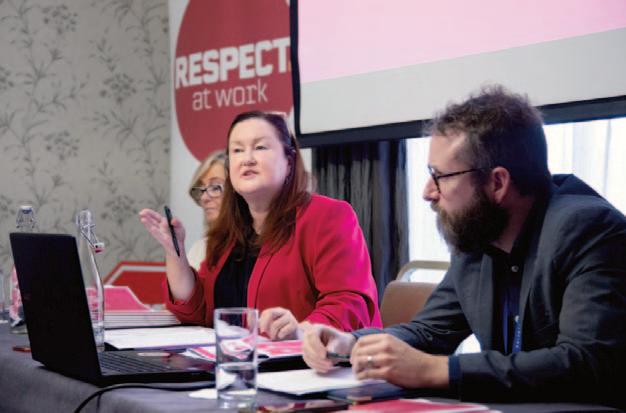
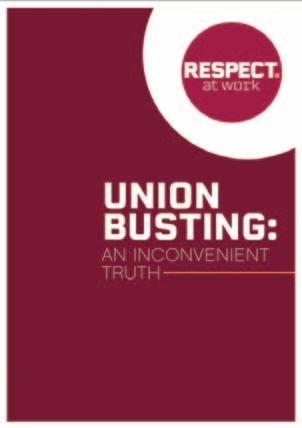
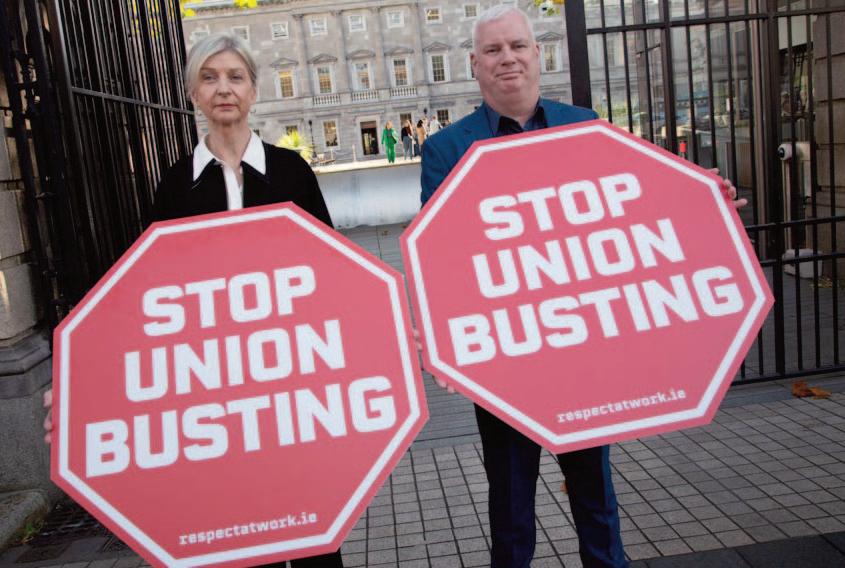

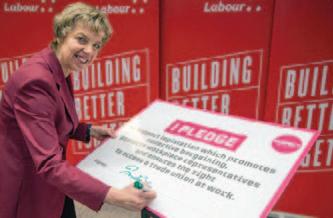
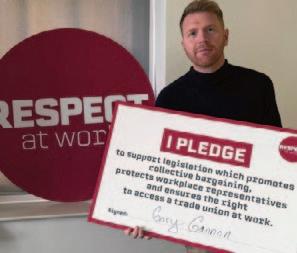



Mandate General Secretary Lorraine O’Brien and Interim Assistant General Secretary Jim Fuery outside the Dáil following the launch of Respect at Work’s Union Busting: An Inconvenient Truth report on October 23
SIPTU Deputy General Secretary Ethel Buckley at the report launch with its lead author Dr Gareth Murphy (right)
Getting the R@W facts by the Shannon
By Ken Reilly Industrial Officer/Organiser
THE RESPECT at Work campaign (R@W) and its momentum and effort towards pressurising the establishment towards full implementation of the EU Directive on Adequate Minimum Wage has been quite prominent in recent Mandate publications, social media platforms, as well as this year’s May Day rally, and featured heavily in the build up to this year’s European Elections.
The campaign focusses particularly on Article 4 of the Directive, which provides for the promotion of collective bargaining and trade union access, along with robust protections for workers suffering from victimisation and dismissal based on trade union activism in their own workplace.
On 5th and 6th September, The Bush Hotel in Carrick-on-Shannon was the scenic location for the launch of the Respect at Work General Election Campaign, and attendees were provided with a sneak preview of the preliminary results from the research on union busting in the Republic of Ireland, commissioned by the R@W campaign and carried out by researchers at Queen’s University, Belfast.
One of the most eye-catching results from the research was that a whopping 74% of workers in this country experienced some form of anti-union behaviour from their employer. The impact this type of action has on workers ranges from stress, lack of sleep, isolation to severe mental health issues and depression.
ICTU General Secretary Owen Reidy highlighted that there are more than 180 supports available
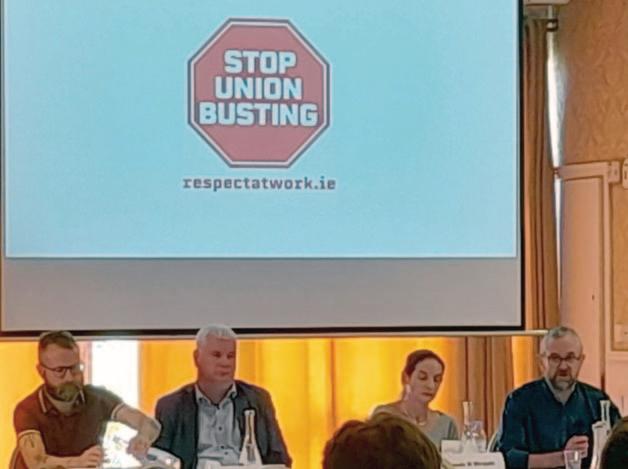
Respect at Work – the SIX big asks:
1. Ban union-busting once and for all.
2. Protect union members so that they cannot be victimised, discriminated against or dismissed for their union activity.
3. Provide the right to join a union for workers that positively encourages union membership and protects them from victimisation.
4. Introduce legally protected facilities for union reps so that they have the means to discharge their functions for their members.
5. Provide the right of workers to access trade unions so they can know their rights, talk and ask questions of their relevant trade union in their workplace.
6. Public funding should promote collective bargaining, as per the EU Directive. Include collective bargaining as a positive attribute in all public tendering processes.
for businesses, from 16 different state bodies, yet workers have no legal right for their union of choice to be recognised, and their employer can simply choose not to engage in third party resolution mechanisms if it so wishes.
There were two very different panel discussions conducted on the second day of the seminar, and both were well received and brought focus and energy to the campaign, as it switched from European to General Election mode.
The first discussion, which followed Professor Niall Cullinane’s presentation of the preliminary findings from the Queen’s University research, was comprised of Respect at Work Campaign Leads, representing each of the four unions who initiated this campaign.
Fionnuala Ni Bhrogain (CWU), FSU’s Gareth Murphy, Darragh O’Connor (SIPTU), and Mandate Interim Assistant General Secretary Jim Fuery, set out the plan for the next phase, what to expect, how to help drive it forward, as well as giving an update on what had been achieved thus far.


‘Three pillar approach’ to 5% over 2 years pay deal
MANDATE has brokered a two-year deal on pay with Brown ThomasArnotts which will see salaries rise by a total of 5% over the period. The agreement, running from May 2024 to May 2026, means employees got a 2.5% pay rise in May 2024 and will get a further 2.5% increase in May 2025.
Other elements of the deal include a €250 gift card for
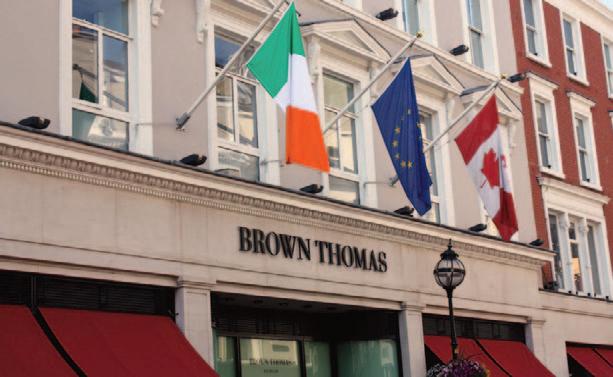
removed, allowing
Jim Fuery told the seminar: “No union in this country would survive without the bedrock that is the shop steward, and the union activist. We need to fight to get this legislation in, [and] to protect these and future workers.”
When the programme moved on to the next panel discussion, it was made up of worker activists – again representing all four unions – who recalled their personal experiences
group, which is owned by UKbased Selfridges.
Interim Assistant General Secretary Jim Fuery told Shopfloor: “The National Negotiation Committee, comprised of Mandate officials and shop stewards from BTA stores across the country, were happy to recommend these proposals to our members in Brown Thomas Arnotts.
“This claim based on a threepillar approach worked well in these negotiations.
“The pay increase and gift card are always among the union’s asks with this employer but the third pillar was equally important, this clause of the agreement now allows our members to decide the age at which they will retire.
“Their retirement age can remain as 65 or be later in life if they choose to work longer.”
of working for, coping with, and fighting against anti-union behaviours in their own workplaces.
Representing Mandate Trade Union, and retail workers across the country, one member, who has been a long-standing activist, went into great detail in explaining the campaign he led some years ago while working for a major retailer in South Dublin Wicklow.
This member and his colleagues spoke about how repeated attempts to engage locally and to have their concerns addressed were rebuffed by the employer – to the point where a Labour Court recommendation suggested the employer either engage with Mandate and the WRC in order to resolve the numerous issues.
The employer duly ignored this recommendation, which ultimately lead to the workers taking industrial action to finally bring the company to some semblance of sense. This activist spoke about how the pressure of the “constant battles and union-busting” had “taken its toll, mentally and physically”. He added: “We have what feels like a once-in-alifetime opportunity with this EU Directive to put it right.”
Here's hoping the Government listens to the concerns of workers the length and breadth of the country, including some of our own Mandate members, who have lived and experienced union-busting at first hand.
They will not walk voluntarily into this, and no matter which parties form the next government, we all have a part to play in pressurising our locally-elected representatives to strengthen and legally enforce trade union recognition, trade union access, and collective bargaining rights.
Mandate members working for McCambridge's Bakery in Dublin are voting on a set of pay proposals for 2025-2006 that will see employees’ salary rise by 2.25%. Under the agreement, they will also pocket a bonus of €2,600 each.
Picture: Johnson (CC BY 2.0) members working under 22.5 hours a week, while those working more than 22.5 hours received a €500 gift card.
Trade union density
Trade union density is measured as the share of employees who are a member of a trade union (in percent) of the overall workforce (OECD/AIAS ICTWSS database, 2019 or the most recent year available)
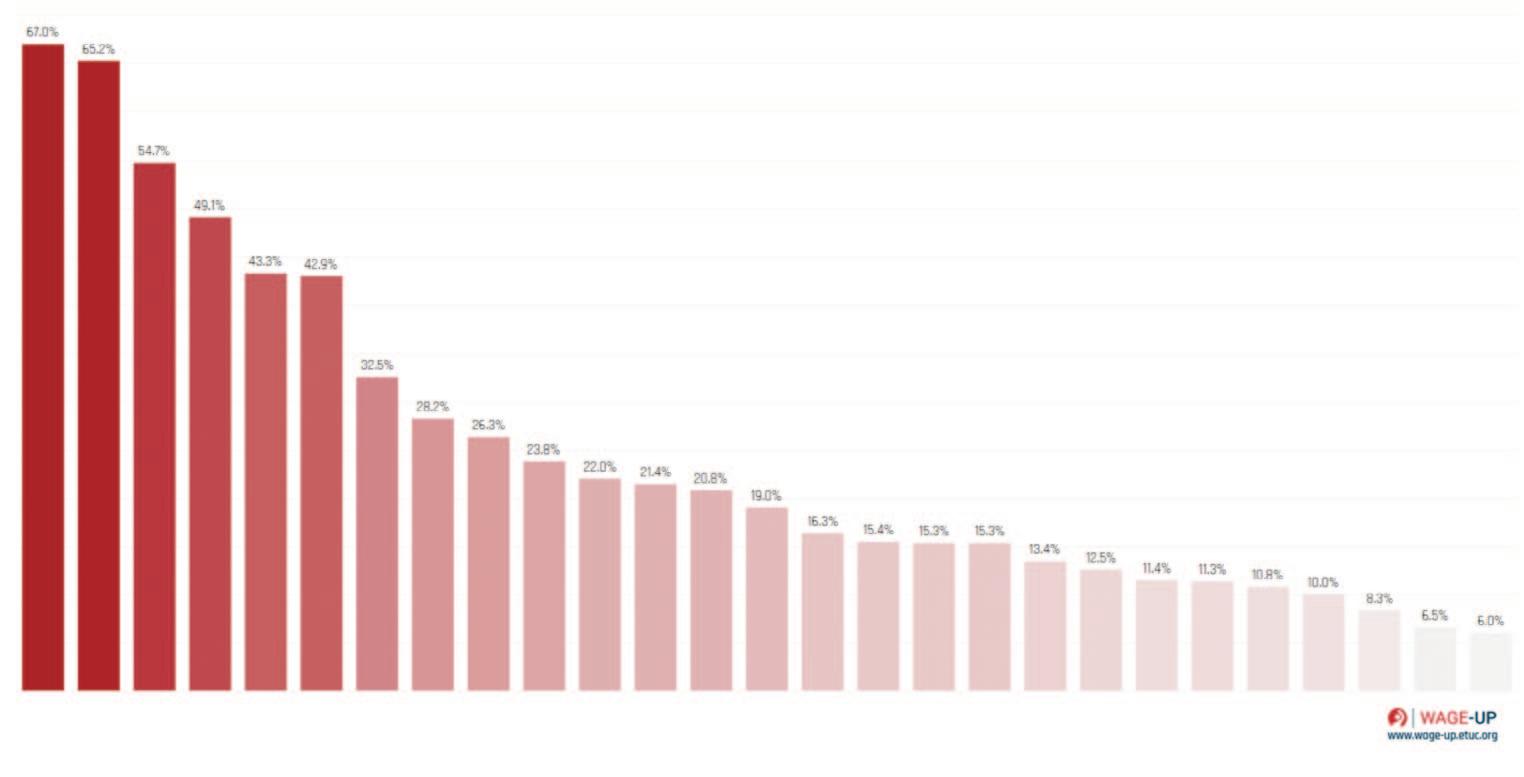
Collective bargaining coverage
Collective bargaining coverage is measured as the share of employees covered by a collective agreement (in percent) of the number of employees with the right to bargain (OECD/AIAS ICTWSS database, 2021 or the most recent year available)
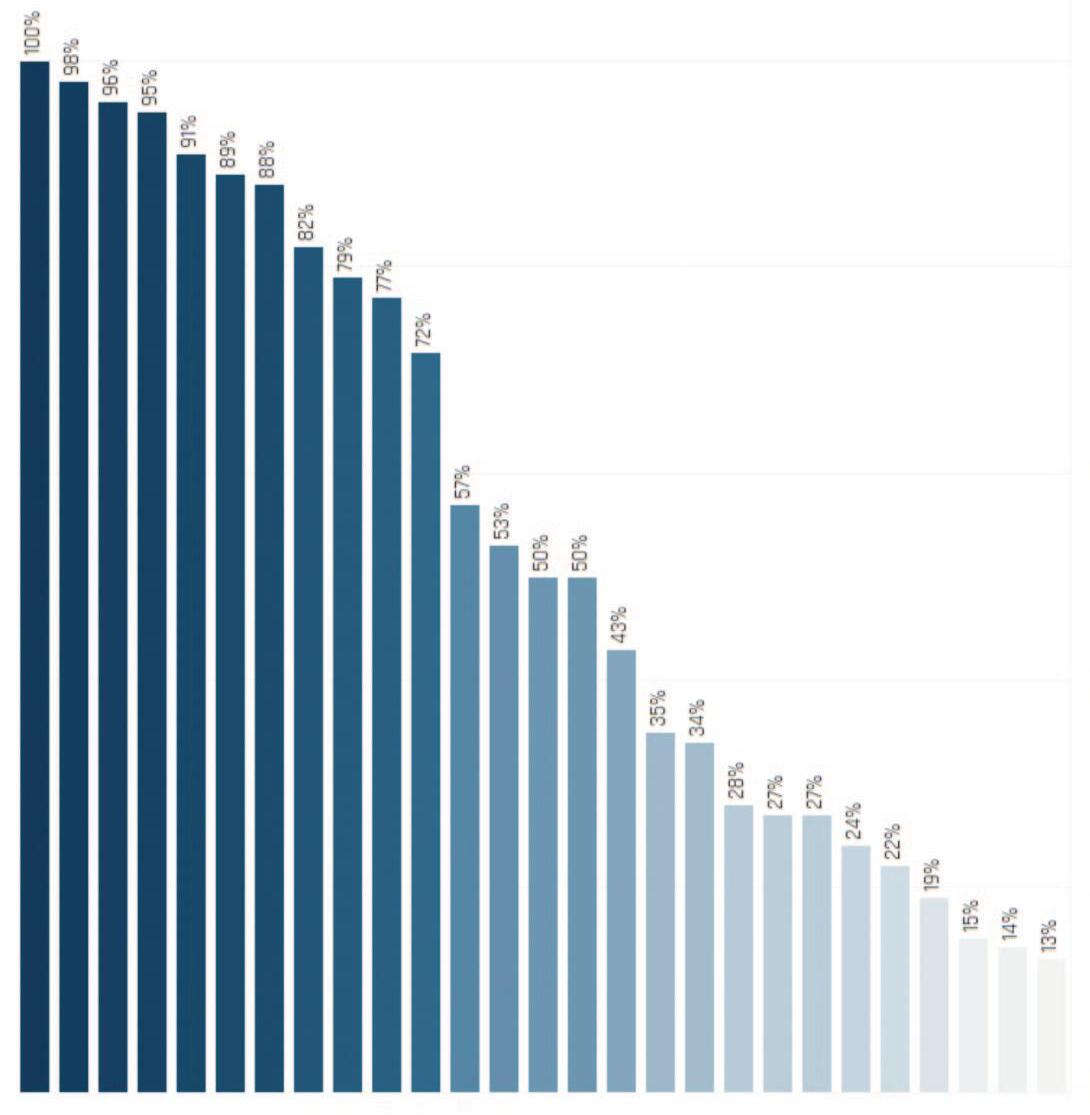
NEWS
‘Acceptable outcome ‘
MANDATE members at Valeo Foods voted unanimously to back a pay package of 3.9% across all grades. The deal, brokered following a conciliation hearing at the Workplace Relations Commission, covers the period April 2024 to April 2025.
The matter had earlier been referred to the WRC after no agreement was reached at local level despite four rounds of talks.
Divisional Organiser Greg Caffrey told Shopfloor: “There were extensive negotiations to come to a settlement on pay in this employment – but we were glad that we were able to secure an acceptable outcome.”
COMANS BEVERAGES
Unanimous vote in favour VALEO FOODS
MEMBERS working at Comans Beverages have voted unanimously in favour of a pay and benefits package for 2025 – 2026.
The set of proposals, agreed with the help of shop stewards in Dublin Keg and Dublin Pack, involve a 4% pay increase across all grades, and a boost to lunch allowances from €12 to €14 a day.
Also included is a €1,000 Christmas bonus and an incentive scheme for potential track drivers, with training and licence provided by Comans. Adding to the festive flavour of the deal, staff race days and Christmas parties will continue as before.

NORTH & WESTERN DIVISION
Mandate members from ‘forgotten county’ outline poll priorities
MANDATE’S North and Western Division outlined the priorities of members living in the “forgotten county” in a special video presentation in the run-up to the General Election on 29th November.
The video, posted on YouTube before the poll, is part of a union campaign to lobby for better resources in Donegal and stemmed from a 2022 BDC motion on the issue.
The producers of the video called for:
l An “end to end” redress scheme for mica home owners;
l The upgrading of Letterkenny hospital from a Level 3 to Level 4 health facility;
l The introduction of rent controls and an eviction ban;
l A “use it or lose it” policy on house dereliction in the county.
In the video Letterkenny Local Council chairperson Kevin McCall said Donegal people had reached a “crisis point” and needed to elect politicians “who will put the people of Donegal first”.
Pointing out the Donegal people were naturally “mild mannered” and probably “too civil for our own good”, he insisted: “We will not be a forgotten county any more.”
Kevin is joined on the video by Mandate colleagues Janice O’Loughlin, John Joe Doherty, Claire Houston, and Lee Ponsonby speaking on each of the key issues.
Claire said: “When you see the number of empty houses and the number of people who are struggling to have a home, it doesn’t make sense in this day and age.”
John Joe agreed pointing out that “countless” homes were lying empty – some for 30 years – against the backdrop of a desperate need for housing in the county. He added: “It’s
WICKLOW LOCAL COUNCIL
disgusting for people like me and my friends who can’t afford to live here.”
Speaking on the mica crisis, Lee said: “The [current redress] scheme expects us to pay a percentage of the money [for rebuilding and repair] – which people can’t afford. It is not the people of Donegal’s fault that this happened. It’s the Government’s fault – they should have been looking into the quarries a lot more.”

Janice, speaking outside Letterkenny Hospital, called for the introduction of specialist care at the facility, explaining that she had to travel regularly to Dublin to access care for her daughter who has a chronic illness.
Check out the full video at: https://www.youtube.com/watch?v=iWZrHGEON8
‘Green shoots of organising progress’
DIVISIONAL Organiser Greg Caffrey has thanked members of Wicklow Local Council for their help in nurturing the “green shoots” of progress during a recent recruitment and organising drive across the county.
He told Shopfloor: “We were greatly helped by our VP Joe Quinn and fellow NEC member Cian Keogh as well as by other members of Wicklow LC. There’s no doubt
that through all these efforts, the green shoots of organising progress have been realised.
“We will ensure that these efforts will be built upon with a view to implementing the initiative across the Dublin South & Wicklow.”
Greg added: “Sincere thanks to all members of the LC for their willingness in giving up their time in making this campaign such a great success.”
Dispensers agree to Boots deal
IN NOVEMBER, Boots dispensers voted to accept a Mandate-negotiated deal that will see them pocket a 3.5% salary increase, along with a boost of €1,500 to the entry level rates of pay.
The top rate for dispensers also increased by €1,500 in the agreement which runs from 1st November 2024 to 31st October 2025.
Southern Division Industrial Officer/Organiser John O’Donnell expressed delight at the outcome. He told Shopfloor: “We continue to improve our dispensers’ terms and conditions, and this is yet another
agreement that we're extremely happy with.
“Added to that we’ve also increased the number of Boots dispensers who have joined the union as a result of this deal.”
Talks on behalf of Boots sales advisors and customer assistants, the other category of employee represented by Mandate, have also started.
A number of meetings have already been held with management and O’Donnell is hopeful of a successful conclusion before Christmas.



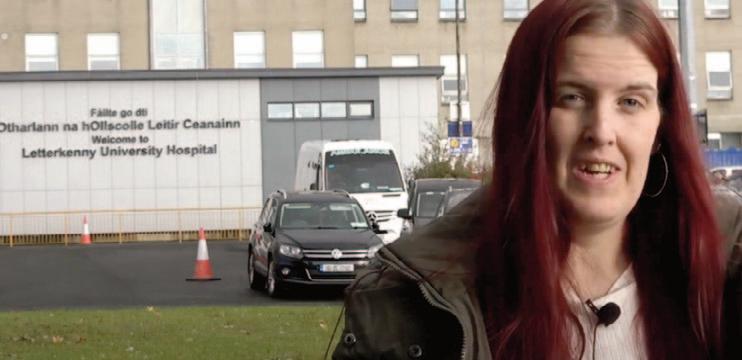
The [current redress] scheme expects us to pay a percentage of the money [for rebuilding and repair] – which people can’t afford. It is not the people of Donegal’s fault that this happened. It’s the Government’s fault – they should have been looking into the quarries a lot more.

Stop the carnage
MANDATE President Martin Mahony, along with the Mandate delegation, holds the Palestinian flag aloft at the National Demonstration for Palestine on Saturday, 5th October. The demo, organised by the Ireland-Palestine Solidarity Campaign, and supported by more than 150 civil society groups, was called to mark the first anniversary of the conflict in Gaza, which has claimed the lives of more than 46,000 people.
Letterkenny LC chair Kevin McCall fronted up video
Donegal voices: (From left) John Joe Doherty, Claire Houston, Lee Ponsonby, & (below) Janice O’Loughlin
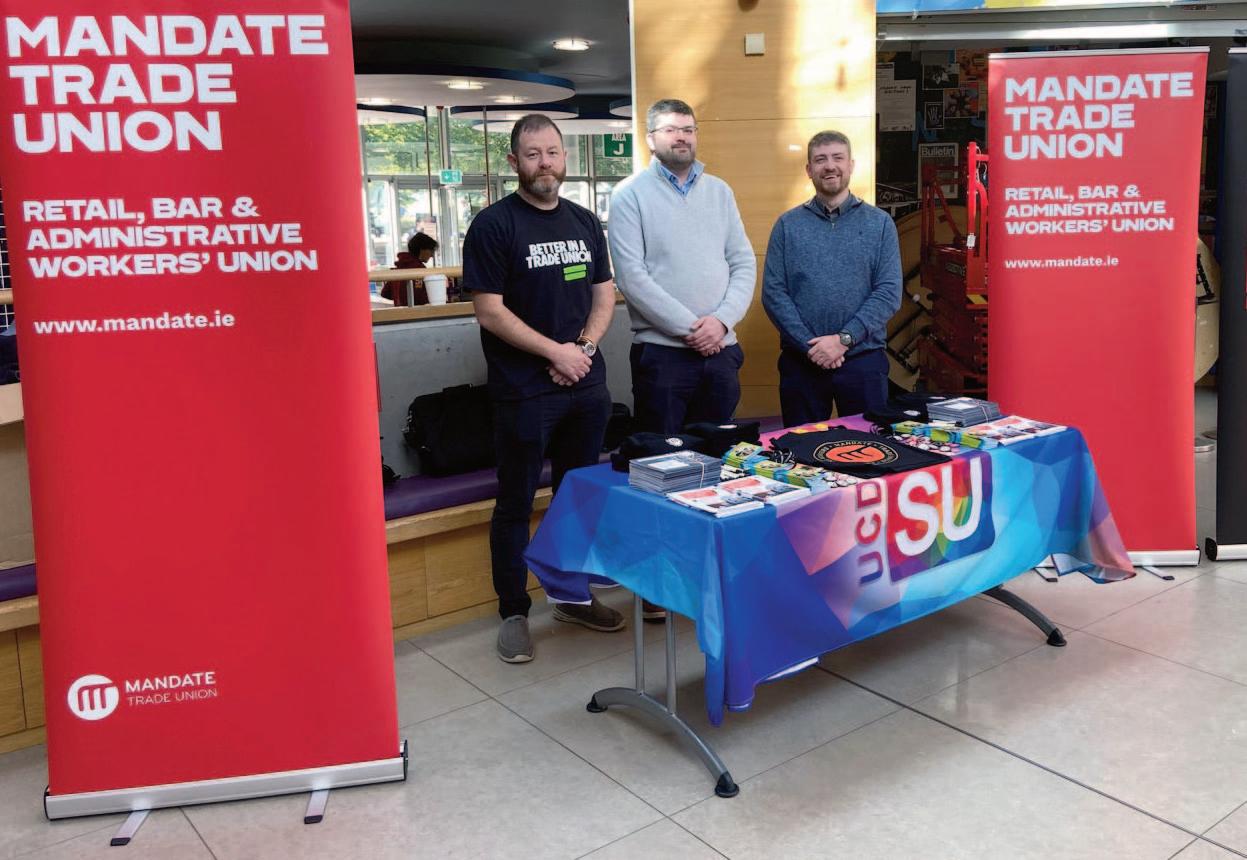
Setting out the Mandate stall...
Mandate officials Ken Reilly, John O’Donnell, and Greg Caffrey set out the union’s stall at UCD on 2nd October. Student outreach plays a key part in passing on the benefits of trade union membership to the next generation. John O’Donnell told Shopfloor: “We had a great day engaging with the students at UCD, especially in outlining our ‘Fair Wages for All Ages’ campaign on sub-minimum wage rates and in speaking to them about their basic rights in the workplace and underlining the importance of having a collective voice.”
UK retail workers’ union Usdaw has claimed shop theft is the biggest single ‘trigger’ for violence, threats, and abuse directed against its members. The shock claim came in interim results from a survey of 4,000 shop workers and coincided with Usdaw’s Respect for Shop Workers Week in November.
Survey respondents reported that over the past 12 months:
l 69% had experienced verbal abuse.
l 45% were threatened by a customer.
l 17% were assaulted.
l 70% of these incidents were triggered by shoplifting and twothirds of those were linked to addiction.
Usdaw General Secretary Paddy Lillis said: “It is shocking that over two-thirds of our members working in retail are suffering abuse from customers, with far too many expe-
riencing threats and violence.
“Seven in 10 of these incidents were triggered by theft from shops.
It has become increasingly common for retail stores to be targeted by organised crime gangs stealing to order amid a retail crime epidemic.”
Insisting that theft from shops was not a “victimless crime”, he said that incidents of thefts regularly turned into “major flashpoints of violence and abuse against shop workers”.
And in the run-up to Christmas, Irish-born Lillis also called on festive shoppers to “keep your cool” in dealing with retail staff.
“In the run-up to Christmas, the number of [threatening] incidents increases as shops get busy and customers become frustrated. This is a hugely important issue for our members and they are saying loud and clear that enough is enough,” he added.
Mandate members working in Garvey’s SuperValu stores in Listowel, Castleisland, and Corbally have voted to accept a 4% pay increase over 12 months as well as the retention of a 15% Real Rewards discount.
Industrial Officer Caroline Clifford told Shopfloor: “Our members in all three location welcomed the deal. Negotiations for each store were carried out on a store-by-store basis as the company does not negotiate with Mandate as a group. What this means is that when the agreements come into operation and end differs between stores.”
l SuperValu Listowel, Co Kerry, runs from 1st July 2024 until 30th June 2025.
l Both SuperValu Castleisland, Co Kerry, and SuperValu Corbally, Limerick run from 1st December 2024 until 30th November 2025.
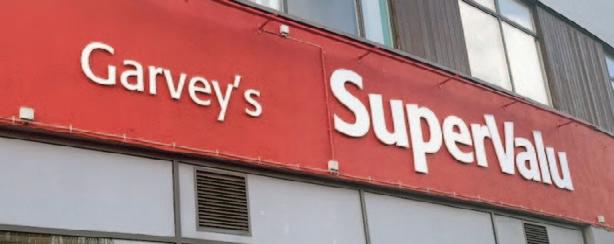

INDUSTRIAL RELATIONS
Power dynamics at play in the workplace
Western Divisional Organiser Dr John Carty delivered this year’s Annual Irish Association for Industrial Relations’ James Connolly Memorial Seminar at the Atlantic Technological University (ATU) in Galway City on 12th November.
The seminar, attended by ATU students and lecturers from a number of universities, was a well-received and thought-provoking look at the unequal power dynamics within labour markets and workplaces and the role played by unions in addressing injustices.
Event organiser ATU academic Dr Michael Moran, a lecturer in HRM/Management, described the event as “an excellent lecture on workplace injustice and how employees can collectively respond”.
John Carty explained that workers in the medium and long-term are disadvantaged in most labour markets due to unemployment. Employers on the other hand can often provisionally rearrange the workforce and working time to their advantage in the short term. This means that there is less urgency on

their part to fill any vacancy.
He described the job interview as the “bridge” between the labour market and the workplace and pointed out that this was also an unequal process as frequently there is more than one worker seeking the one job.
“The time, date, and venue are picked by the employer as well who sits on the interview panel – but if a worker turned up with their chosen representative, they are unlikely get the job or even to be interviewed in the first place!”
A successful candidate at interview is offered an employment contract on a ‘take it or leave it basis’.
John continued: “Again the boss sets the terms and, in most workplaces, it is not a negotiated agreement between equal parties but one of a worker’s subordination.
“As the employer’s job offer is fixed in terms of a rate of pay, holidays, breaks etc but the worker’s input of physical, intellectual, and emotional labour has yet to emerge, and this is another source of a sense of injustice and conflict.”

For John, power relationships in the workplace are clearly set out: “As citizens we can vote for whomever we like, as consumers we can buy whatever we can afford, but at work we do as we are told.”
He suggests that these power imbalances in the labour market and workplace are the root causes of injustice. “Unions don’t create the injustice – it’s already there,” he added. John said that employers seek to control the situation further through a number of ways – an out-
right refusal to recognise trade unions, through the stonewalling of negotiations, or by making “sweetheart deals” with moderate unions or set up employee representative bodies that employers indirectly control.
They also use HR departments and even seek to misuse language when defining employees.
John said: “Employers want employees to identify themselves as part of the organisation they work for – but not as a separate entity
known as a ‘worker’. Tesco, for examples, won’t call their workforce ‘workers’ or ‘employees’ but label them ‘colleagues’. Other employers call workers ‘associates’ or ‘team members’.
“They also like to talk directly to workers as individuals rather than talking to their union reps, and by doing so, fragmenting the collective power of the workforce.”
John pointed out that HR managers are “hired by the employer in the interest of the employer” and insisted HR itself “is a form of union substitution”.
Against this subtle and not-sosubtle manipulation, John thinks it’s vital that workers develop a clear sense of themselves as workers. That’s why unions exist – to organise workers and to put in place a legacy that can provide concrete examples of what workers can do collectively in any given situation.
He said: “You need a collective memory – the victories, the defeats and all the rest – someone needs to record, keep the archives, and to teach future generations how to organise.
“The State is never neutral in Industrial Relations. I was trying to get this point across at the lecture –don't be thinking that if you take a case to Court, you're going to get justice. I draw a distinction between law and justice – they're two separate concepts. The fact is the State is non-interventionist on the side of the employers.”
Training programme 2025
All courses are subject to change/cancellation depending on Tutor availability and numbers
list for the next available course. Please contact your local Mandate office or
Training Dept by email ablake@mandate.ie
Dr John Carty delivers this year’s James Connolly Memorial Seminar at ATU
